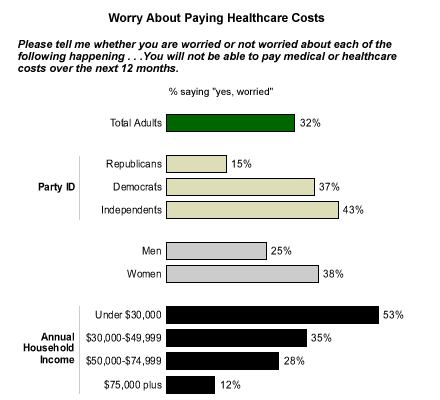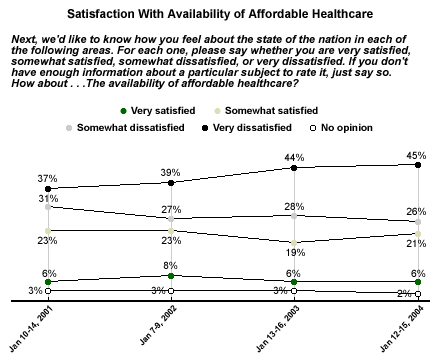As the 2004 election season bursts from the starting gate, screaming through the early caucus and primary contests, promises to reduce burgeoning healthcare costs for Americans are already a familiar topic among Democratic presidential hopefuls. And not without good reason. Americans identify healthcare costs as the most urgent health problem facing the nation, a third of them are worried about being able to pay their medical bills this year*, and only roughly over a quarter are satisfied with the affordability of healthcare.
After the economy and Iraq, healthcare costs may well be the foremost issue in the election. A recent CNN/USA Today/Gallup poll found that to be the case at this early stage in the election year. TIME magazine’s cover boasted a special investigation on "Why your drugs cost so much." The story cited a Health Affairs report that revealed that in the United States, healthcare spending rose 9.3% in 2002, the largest increase in 11 years. Those on the campaign trail should pay attention to those most concerned.
Key demographic gaps emerge in Americans’ level of concern about the affordability of healthcare over the next 12 months. Women are more likely than men to worry about the ability to pay their medical bills (38% versus 25%). Income level, as may be expected, has a big effect: More than half of those with annual household incomes under $30,000 worry that they won’t be able to pay for medical or health care in the coming year, compared with only 12% of those in the $75,000 and over income bucket.

A Jan. 12-15 Gallup Poll asked a slightly different question about satisfaction with the availability of affordable healthcare. In that more recent poll, 7 in 10 Americans express dissatisfaction (45% saying they were "very dissatisfied") with the availability of affordable healthcare**. The earlier data in our three-year trend suggest that the level of extreme dissatisfaction has increased in the three years since George W. Bush took office -- from 37% in January 2001 (immediately prior to Bush’s inauguration) to 45% in the most recent survey.

Bottom Line
Fear about being able to pay for medical bills keeps Americans from getting the care they need. In a November 2003 Gallup Poll, about a quarter of Americans reported that they did not seek medical care in the past 12 months because of the cost. Many medical experts feel this hesitancy -- especially the neglect of preventive care -- places a burden on the efficiency and effectiveness of the U.S. healthcare system. Secretary of Health and Human Services Tommy Thompson said last April about preventive care:
"Approximately 95% of the $1.4 trillion that we spend as a Nation on health goes to direct medical services, while approximately 5% is allocated to preventing disease and promoting health. This approach is equivalent to waiting for your car to break down before you take it in for maintenance."
In this election year, an important question for all of the candidates is how they propose to reduce Americans’ worry about cost burdens so this troubling cycle can be broken.
*Results are based on telephone interviews with 1,029 national adults, aged 18 and older, conducted Jan. 2-5, 2004. For results based on the total sample of national adults, one can say with 95% confidence that the maximum margin of sampling error is ±3 percentage points.
**Results are based on telephone interviews with 1,004 national adults, aged 18 and older, conducted Jan. 12-15, 2004. For results based on the total sample of national adults, one can say with 95% confidence that the margin of sampling error is ±3 percentage points.